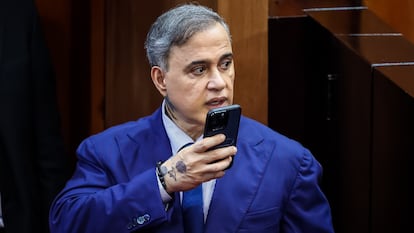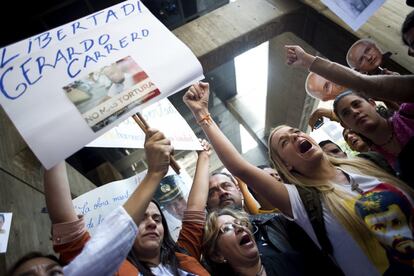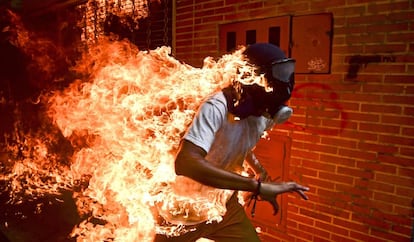Tarek William Saab, the poet and friendly Buddhist who ended up as the feared attorney general of Venezuela
The enforcer of the most controversial judicial decisions against activists and political opponents, he has traversed a bumpy path to impose the revolutionary narrative amidst the Venezuelan crisis

A committed Chavista militant, poet, Buddhist, founder of the ruling United Socialist Party of Venezuela (PSUV), governor, ombudsman, promoter of rock concerts and the current attorney general of his country, Tarek William Saab, a revolutionary since his youth, is one of the most controversial figures within the government of President Nicolás Maduro. He has been a big part in the political leadership that has controlled Venezuela for the past 25 years, since Hugo Chávez rose to power in 1999.
A lawyer who specialized in criminal law and human rights, Saab was appointed attorney general back in 2017 by the now-defunct National Constituent Assembly, a forum that appropriated the functions of the National Assembly, which was elected in 2015. The same year he was elected, the legislative branch of government, dominated by the Venezuelan opposition, was shuttered, amidst a wave of massive anti-Chavista protests throughout the country.
Since then, Saab has had to face the battery of accusations made against the Venezuelan state for committing excesses against opposition activists. He has also been held to account for alleged crimes against humanity that have occurred during the government of Nicolás Maduro (2013-present), who assumed power following the death of Chávez. Various accusations against the regime have been made by international bodies, including the Office of the United Nations High Commissioner for Human Rights and the International Criminal Court.
Saab first became a public figure due to his participation as an activist in defense of victims of the “Caracazo,” on February 27, 1989, when widespread riots broke out in Venezuela in opposition to austerity measures. The government of Carlos Andrés Pérez handled the outburst clumsily, with the response resulting in a high number of deaths.
After that, Saab became a frequent visitor to Caracas newsrooms. Affable and polite, he was a regular source for many journalists, working to address unsolved stories and failures in police work.
Born in El Tigre, in the eastern state of Anzoátegui, Saab is the son of a Lebanese immigrant couple. Now 62, he’s divorced with children. In the 1980s, he was a follower of Douglas Bravo, a famous ex-guerrilla, and was active in Ruptura, a radical leftist organization that didn’t believe in the electoral narrative of democracy.
When Chávez became president in 1999, Saab’s transition from the opposition to being in power, along with his permanent overexposure in the public eye, produced some changes in him. Once thin with straight hair, cordial and folksy, someone who understood the work of journalists, he is unrecognizable today.

A devoted Chavista militant since the genesis of the movement in the 1990s, as the years went by he gradually entered into repeated disagreements with the press. His constant conflicts with the opposition turned him into a distrustful, irritable character, highly sensitive to criticism. This was especially the case during his tenure as governor of Anzoátegui (2004-2012).
Saab’s appearance began to change: a frequent visitor to gyms, already divorced, he wore casual outfits as governor and became a determined promoter of rock concerts in the city of Puerto la Cruz, a traditional tourist destination in the east of the country. With several new tattoos, he liked to offer a youthful, approachable image to the electorate, in support of the revolutionary narrative.
Tarek William Saab became a delicate, explosive character. Difficult to interview, sometimes haughty. The work of the press got on his nerves. He never trusted the opposition’s intentions. He took every question posed to his government personally. He also reacted indignantly to anyone who questioned his performance as a human rights activist.
It especially offends Saab that his adversaries say about him what they also say about other famous Chavistas, such as José Vicente Rangel or Jorge Rodríguez: that once he rose to power, by inhibiting the public’s right to a political alternative, he has ended up committing excesses similar to. or worse than, the ones he denounced in the democratic framework of the past.
Frequently questioned for being so closely aligned with Maduro’s government and for defending the regime on the international stage, Saab certainly isn’t the attorney general for a conventional, democratic government. Rather, he represents a revolutionary state, a state that no one has decreed and that isn’t in the Constitution. However, the ruling party, as the political body within the national state. has responded to this supposed revolutionary reality.
Amidst the political crisis of 2017, one of Saab’s sons, Yibram, expressed solidarity with the opposition protests and with the students killed in clashes with the police. He publicly questioned his father’s positions and made a statement inspired “by the principles and values” that he would have once instilled in him. Saab, the attorney general, asked that his son’s opinions be respected. They were mercilessly used on social media by his opponents.

“I received a kind of transnational criminal cartel, [a situation of] organized crime totally structured to commit crimes,” Saab himself stated from the Attorney General’s Office, when commenting on anti-corruption operations that he ordered. He harshly criticized his predecessor, Luisa Ortega Díaz, in one of his reports to parliament.
Sanctioned in several countries for conspiring to undermine democracy and for his lack of independence when it comes to investigating human rights abuses committed by the Venezuelan state, Saab is also the author of 13 books of poetry (a star recipient of state publishing funds) and a frequent presence in official cultural meetings.
Under his management, a particularly aggressive and unprecedented policy for animal protection has been advanced, with legal instruments that impose severe penalties on offenders. He has assertively pursued popular demands or obvious injustices that go viral on social media, to establish some notion of timely justice.
“Without any legal reason, the International Criminal Court is coming, responding, in origin and essence, to political pressure from the centers of global power, to [interfere with] the independent work of the Venezuelan justice system,” he said, in one of his recent pronouncements.
Sign up for our weekly newsletter to get more English-language news coverage from EL PAÍS USA Edition
Tu suscripción se está usando en otro dispositivo
¿Quieres añadir otro usuario a tu suscripción?
Si continúas leyendo en este dispositivo, no se podrá leer en el otro.
FlechaTu suscripción se está usando en otro dispositivo y solo puedes acceder a EL PAÍS desde un dispositivo a la vez.
Si quieres compartir tu cuenta, cambia tu suscripción a la modalidad Premium, así podrás añadir otro usuario. Cada uno accederá con su propia cuenta de email, lo que os permitirá personalizar vuestra experiencia en EL PAÍS.
¿Tienes una suscripción de empresa? Accede aquí para contratar más cuentas.
En el caso de no saber quién está usando tu cuenta, te recomendamos cambiar tu contraseña aquí.
Si decides continuar compartiendo tu cuenta, este mensaje se mostrará en tu dispositivo y en el de la otra persona que está usando tu cuenta de forma indefinida, afectando a tu experiencia de lectura. Puedes consultar aquí los términos y condiciones de la suscripción digital.








































